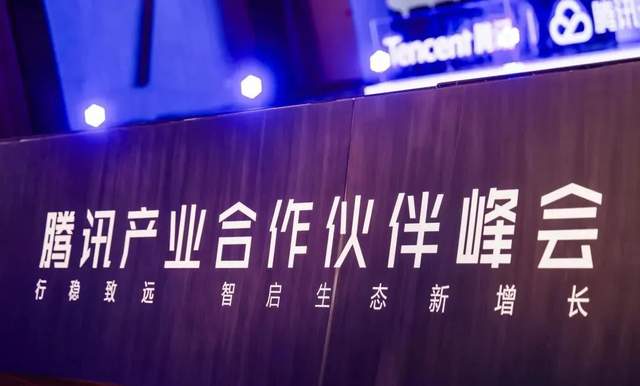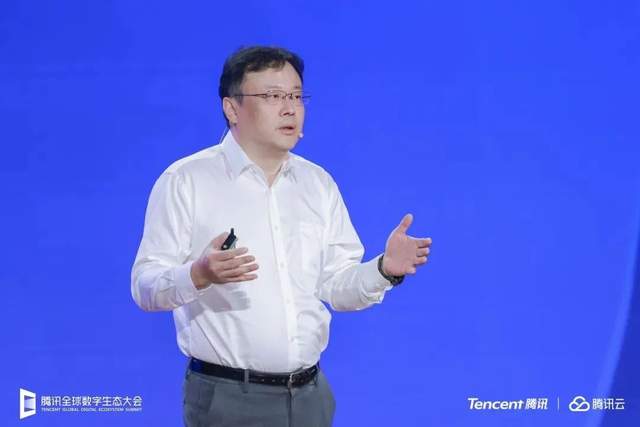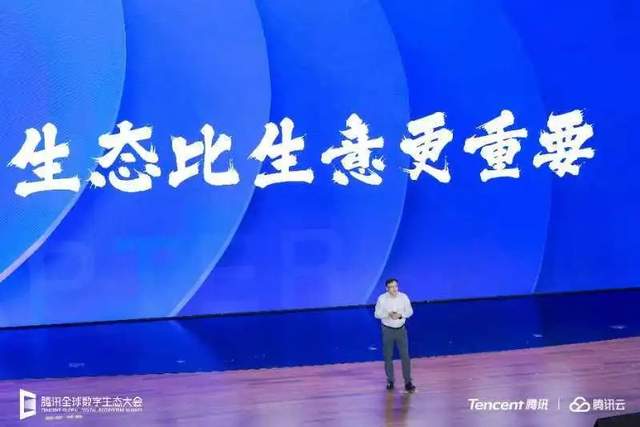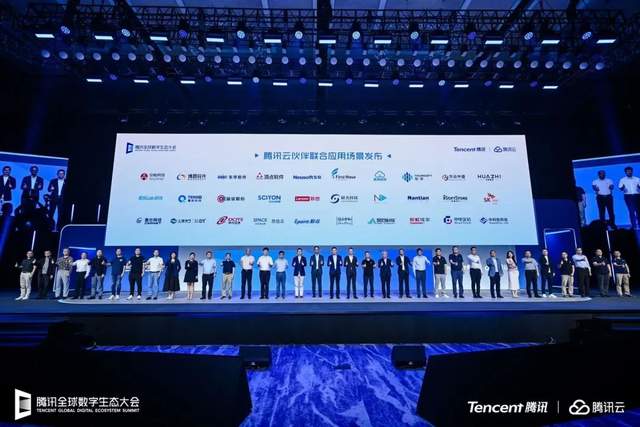Tencent Cloud builds ecosystem, two words summarized in seven years
![]() 09/06 2024
09/06 2024
![]() 478
478

Tencent Cloud's basic policies have remained largely unchanged over the past seven years, providing predictable confidence for partners to continue investing.
On September 5th, the annual Tencent Global Digital Ecosystem Conference arrived as scheduled. This year, Tencent Cloud has identified three main avenues to support enterprise growth: artificial intelligence, going global, and integrated innovation.
These are all recognized development trends in the industry with significant growth potential. However, the development of these businesses still relies heavily on the strength of ecosystem partners. As a cloud vendor committed to a product-focused and integration strategy, Tencent Cloud is deepening its collaboration with partners.
Tencent Cloud has been proactively transforming its business for several years, and the core of its ecosystem strategy can be summed up in two words: stability. Stability in policies, organization, and personnel runs through everything.
As ToB vendors actively improve their respective ecosystems, the outside world is also interested in Tencent Cloud's thoughts and practices. Can Tencent Cloud rely on this ecosystem to form a closed loop for ToB services?
01
Stability is the cornerstone of ecosystem building
In the past six months, Yang Chen, Vice President of Tencent Cloud and Head of Industrial Ecosystem Cooperation, has noticed that many partners outside the Tencent Cloud ecosystem have begun reaching out proactively to discuss business cooperation, a significant increase from previous years.
These partners include top channel partners of competitor public clouds. On the one hand, there is a trend towards multi-cloud strategies among enterprise customers. On the other hand, these agents hope to participate in multiple vendors' ecosystems, expanding their business scale while diversifying risks. There are also partners who used to focus on traditional offline markets or foreign products but have started embracing Tencent Cloud due to its product advantages in areas like audio-video and databases.
"The core lies in Tencent's commitment to sharing half of its life with partners and placing greater importance on the healthy operation and sustainable development of the ecosystem," said Yang Chen.

In the public perception, while Tencent's annual Digital Ecosystem Conference announces new expansion tracks, there are rarely significant adjustments to new concepts or policy directions in ecosystem building, making it difficult for outsiders to recall profound changes.
Yang Chen receives the most feedback from partners regarding channel policies, which can be summed up in two words: stability. "We hope that our channel policies, like traditional Chinese medicine, can ensure steady progress within a stable and predictable framework. This is a gradual approach to optimization," said Yang Chen.
Over the past few years, Tencent Cloud's ecosystem policies, organization, and personnel have remained relatively stable and consistent without significant adjustments.
This has left a deep impression on Chai Yifei, CEO of Huayu Jiaye. Huayu Jiaye began collaborating with Tencent Cloud in 2017, and the two parties have grown together from scratch.
Over the past seven years, Huayu Jiaye's revenue has increased a hundredfold. According to Chai Yifei, Tencent Cloud's basic policies have remained largely unchanged during this period, with only short-term adjustments made to address differences in specific markets and demands. "This gives partners significant confidence," said Chai Yifei.
Stability, while seemingly a straightforward business principle, is crucial in ecosystem building. For partners, clear and stable rules without arbitrary changes mean predictable revenue, stronger investment confidence, and a willingness to stay committed for the long term.
"Based on your policy stability, I dare to invest. Partners can clearly calculate the input-output ratio and then formulate long-term strategic plans for their enterprises, deciding how much to invest, how to deploy personnel, and how to adjust their structure in line with Tencent's pace," said Chai Yifei. Building an ecosystem requires giving partners a sense of security.
Moreover, Tencent Cloud's collaborative attitude makes him feel at ease. "They approach discussions and planning from an equal perspective, ultimately forming a reasonable solution," said Chai Yifei.
This approach is indeed very Tencent-like. Over the past decade or two, the company has rarely experienced drastic changes, from its business operations to senior management. Tencent Group's main business areas have also remained extremely stable, maintaining steady growth over the years. This has allowed Tencent Group to invest ample patience in cloud business areas such as product development and customer satisfaction.
"Tencent Cloud does not need to rush to support its family at this point, allowing us to avoid more aggressive approaches," said Li Qiang, Vice President of Tencent Group and President of the Government and Enterprise Business Group. "We rarely introduce policies that would disrupt our partners but instead focus on supporting them in expanding their markets." For example, Tencent Cloud has cut back on a significant amount of integration, delivery, consulting, and customized development business, delegating these tasks to partners.
Recently, the cloud market has been engulfed in a fierce price war. However, Tencent Cloud has not been actively participating. They have found that price wars in the cloud market have minimal impact on top customers, who already enjoy bargaining power. It is mid-to-long-tail customers who are truly affected, but due to migration costs, price reductions have not led to mass exodus. Instead, it has led to a de-channeling trend, with more customers originally purchasing through channels now buying directly from official websites, significantly impacting ecosystem partners.
An insider at Tencent Cloud told Digital Intelligence Frontline that Tencent Cloud's reliance on partners is increasing, both in tapping into lower-tier markets and covering traditional industries. "Without partners, we simply cannot operate effectively," they said.
Currently, partner contributions account for over a third of Tencent Cloud's total revenue, with the overall public cloud growth rate among partners being 150% higher than the overall market. Over the past three years, the number of partners with revenue exceeding one million has increased by 150%. Meanwhile, Tencent Cloud is gradually refining its customer segmentation system, clarifying cooperation boundaries and rules with partners, and opening up broader markets to them.
"Our focus has shifted to empowering partners and providing better training to help them better understand our products," said Tang Daosheng, Senior Executive Vice President of Tencent and CEO of the Cloud and Smart Industries Group. Tencent Cloud now offers higher-level service support to partners, a significant change from the past. For example, Tencent Cloud's operation management system is specifically designed for partners, providing them with systematic support, including personnel training and certification.
"Tencent's very stable business strategy over the past few years has, in fact, strengthened the confidence of many partners. Looking back, the double-digit growth achieved by partners is closely related to this stability," said Tang Daosheng.
02
How to adapt partner capabilities to new market demands
Tencent Cloud has developed a network of 11,000 partners, including channel resellers, delivery partners, consulting partners, and ISV partners, offering a diverse range of services.
However, the cloud market's demands have shifted. For instance, the traditional general-purpose internet market is becoming saturated, targeting cloud-native customers. In contrast, there are significant opportunities in serving offline industry customers, but this requires a deep understanding of industry know-how, going beyond mere reselling and potentially offering consulting, delivery, and comprehensive industry solutions.
Apart from basic IaaS demands, customers also have significant needs for PaaS and SaaS products, which offer higher customer stickiness. Furthermore, most cloud customers are concentrated in first- and second-tier cities, leaving ample untapped potential in lower-tier markets.
This implies that the roles of ecosystem partners must evolve, and their capabilities must upgrade accordingly.
After years of collaboration with ecosystem partners, Wu Qisheng, Vice President of Tencent Cloud, stated that Tencent Cloud's future ecosystem development strategy will prioritize both online and offline markets.
While the online public cloud market is already substantial, it represents an existing market. Tencent Cloud's strategy will involve customizing different product combinations for customers' scenarios, offering bundled services, including one-click deployment tools. For example, SMEs with modest performance requirements can leverage Tencent Cloud's proprietary PaaS and SaaS products, facilitating zero-barrier cloud adoption.
IaaS resembles selling unfinished homes with limited added value, leading to low customer stickiness and price sensitivity. In contrast, PaaS and SaaS products are akin to fully furnished homes, sometimes even equipped with smart home technology. From a long-term customer management perspective, many partners are willing to seek differentiation. Huayu Jiaye, for instance, plans to explore new avenues by selling more SaaS products, including Enterprise WeChat, Tencent Meeting, and e-signature services, along with Tencent's proprietary PaaS products like databases.
Moreover, in the online market, Tencent Cloud encourages partners to tap into lower-tier markets like third- and fourth-tier cities. These long-tail customers rely heavily on ecosystem partners for coverage. Previously, a Tencent Cloud partner serviced nearly 200,000 customers in lower-tier markets through telemarketing. Unlike major clients with multi-million deals, these long-tail customers generate annual revenues ranging from a few thousand to tens of thousands, but their profitability can surpass that of top-tier clients.

The offline market, on the other hand, arises primarily from integrated innovation demands. This year, Tencent Cloud will leverage its vast network of agents to promote products related to integrated innovation, such as the database TDSQL, operating system TencentOS, private cloud TCE, big data platforms TBDS and TI, among others.
These products have already passed evaluation and certification by relevant national authorities. For instance, the database has been included in the Ministry of Industry and Information Technology's list of trusted integrated solutions, witnessing widespread adoption among financial and government/enterprise customers.
To deepen collaboration with partners in the integrated innovation market, Yang Chen revealed that Tencent Cloud will comprehensively upgrade its distribution channel system, fostering a group of professional partners with experience in selling and servicing privatized products.
Currently, Tencent Cloud is piloting an MSP service provider certification system. While fully opening up the service market to partners, it aims to help them build more professional service teams, capabilities, and tools. This transformation enables partners who previously focused solely on reselling to offer comprehensive services encompassing business consulting, architecture design, and dedicated operations, enhancing their service value.
This aligns with Tencent Cloud's philosophy of a trinity comprising industry, region, and ecosystem. Serving top customers in an industry inherently requires understanding and experience within that industry, which is crucial for market entry. For example, Tencent Cloud recently forged strategic partnerships with over 30 leading partners across niche industries, jointly launching industry-specific solutions. These solutions can be replicated across regions and ecosystems, facilitating their promotion among mid-tier and long-tail customers within the same industry.
This year, Tencent Cloud has set a new target for its ecosystem – the "Million, Thousand, Hundred" initiative, aiming to collaborate with 100 new track partners focused on integrated innovation, Chinese enterprises going global, and intelligence, jointly exploring markets and enhancing sales and service capabilities; engaging with 1,000 regional market partners; and supporting the cultivation of 10,000 business experts among partners.
However, Wu Qisheng believes that quantity is not the sole indicator of ecosystem prosperity; quality is equally crucial. "Whether the number increases to 8,000 or 15,000, the core logic is to ensure that partners can earn money while fostering mutual growth with our business," he said.
03
Refusing involution, how to lead partners in exploring new avenues
The cloud market has experienced growth anxiety in recent years, leading to internal competition through price wars. Identifying new growth avenues alongside partners is a common challenge faced by all.
In reality, the cloud market has experienced fluctuations. For instance, while the real estate sector struggled, the property management industry grew rapidly. Traditional manufacturing took a hit, but high-end manufacturing, represented by chip and new energy, flourished. Similarly, traditional fossil fuels declined, whereas clean energy grew significantly.
Tencent Cloud has identified three new avenues to support enterprise growth this year, with ecosystem development centered around these tracks.
The first is artificial intelligence. The booming development of large models has sparked a massive demand for intelligent computing power and a rapid growth in related products supporting large model training, "becoming one of the key growth engines for cloud computing vendors in recent times." While Tencent Cloud has not disclosed the specific proportion of large model-related revenue within its overall cloud business, Tang Daosheng revealed that AI growth is exceptionally rapid.
The second avenue is going global. As more customers expand their operations overseas, cloud computing businesses are following suit. However, the mode of expansion has evolved. Instead of directly exporting products, companies must now establish factories and local supply chains abroad, hiring local employees.
This transformation poses two significant challenges: First, rapidly building a digital platform to replicate domestic management models in local factories, exporting China's refined manufacturing management experience overseas. Second, ensuring compliance with local data storage regulations while maintaining centralized cloud-based management and rapid scalability.
For instance, when Midea established a factory in Brazil, Tencent Cloud leveraged CDC technology to swiftly set up a digital operation platform, supporting both rapid business expansion and global resource allocation through the cloud. Currently, Tencent Cloud's infrastructure spans 21 regions worldwide, operating 58 availability zones and over 3,200 global acceleration nodes.
The third avenue is integrated innovation. Government and state-owned enterprises' increasing demands for localization and autonomy have fueled the market for integrated innovation.
"The pace of integrated innovation has accelerated significantly since the second half of last year," said Li Qiang. The biggest challenge in the integrated innovation ecosystem lies in compatibility, requiring a new hardware and software ecosystem adaptable to diverse environments.
Naturally, these new growth avenues cannot be pursued without partner collaboration.
In the AI ecosystem, for instance, Tencent Cloud has jointly launched over 20 industry-specific large models with customers and partners, covering more than 50 industries. Since 2023, leveraging its leading and diverse generative AI products, Tencent Cloud and 1,500 partners have served over 20,000 customers, initially establishing an ecosystem centered on generative AI products. In May this year, Tencent Cloud collaborated with 17 partners to announce a generative AI ecosystem plan. Within this ecosystem, Tencent Cloud provides the technical and platform foundation, working with partners to identify scenarios and develop AI industry applications.

In the global ecosystem, Tencent Cloud established the Global Ecosystem Alliance in 2022. At this year's Global Digital Ecosystem Conference, Tencent Cloud unveiled seven industry-specific, scenario-based solutions co-created with partners, covering popular areas like cross-border e-commerce, gaming and socializing, and consumer electronics.
However, the overseas environment is complex. For instance, data privacy and compliance policies vary widely across regions. Additionally, most overseas deliveries require localization, with some requiring local staff and work visas. Slight negligence could violate local laws and regulations.
So, in addition to providing products for overseas customers, Tencent Cloud is also helping partners to quickly understand the local market. Not long ago, Tencent Cloud launched the "Nanshan School" program, which is mostly attended by CEOs of core partners. Last month, the company specifically went to Singapore and invited the general manager of Tencent's overseas department for face-to-face communication and invited some successful overseas customers to share their experiences.
Tencent Cloud hopes to establish a localized service system and localized service partners. However, Wu Qisheng also admitted that this is a gradual process, and the current overseas ecosystem is still in its early stages.
In terms of integrated innovation ecosystems, Tencent Cloud has also announced the official formation of the "Integrated Innovation Open Alliance" to carry out joint adaptation, joint expansion, and joint innovation with more partners, promote the integration of joint solutions and products, and create benchmark cases for integrated innovation.
At present, Tencent Cloud has nearly 100 products in its integrated innovation knowledge graph, with over 1,400 mutual certifications, and is fully compatible with the mainstream domestic software and hardware ecosystem.
Tencent Cloud mainly focuses on three types of partners in its integrated innovation ecosystem: partners with state-owned backgrounds; partners with a strong foundation in traditional offline businesses, such as major players in Oracle and VMware ecosystems, who have a deep understanding of customers' core business systems and a clear understanding of how to iterate offline systems into an integrated innovation ecosystem; and leading ISVs in each industry, who integrate Tencent Cloud's software products into their applications.
It is not difficult to see that Tencent Cloud's entry into these main sectors has been deeply involved with partners, and the success of these partners will further drive the prosperity of Tencent Cloud's industrial ecosystem, jointly realizing a closed loop of ToB services.








